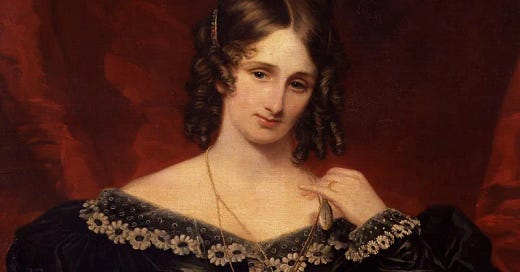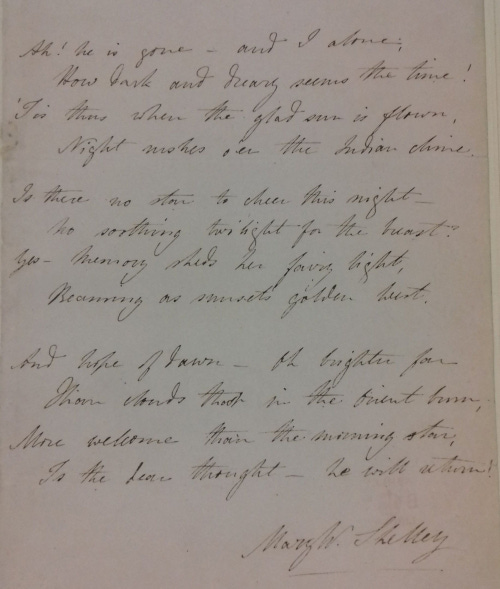There are many possible readings of Frankenstein. We can focus on the undeniable discussion of human pain, of loneliness, of the ambition to create, like gods, that which we can later destroy. But there is also another reading, more melancholy, more tragic, that we can give to this book and in general to the corpus of Mary Shelley, a reading that ends in the question of what it means, and why, are we alive?
Mary Wollstonecraft Shelley lost a lot in her life: a mother, three children, and finally her soulmate, outliving them all, alone with her great work. While reading Frankenstein it is impossible not to find ourselves as readers faced with the doubt of existence. So much pain, so much sorrow and anguish, is it worth it?
But within the intense sensation of loneliness that the creature feels and transmits to us, the book also invites to think about other great ideas: What is beauty? love? human soul? For centuries there have been questions about the human being, for centuries it has been written about it, it has been thought and thought again. Mary Shelley created a unique, masterful piece, in which she may have arrived at an answer, perhaps, or maybe to more questions. The monster, Shelley's creature, presents itself to those with limited sight, with a cold soul, as the villain of the story. That reader who does not read deeply, who does not know how to understand the soul, will think that the monster is the creature, that it is a murderer. But in reality, can we blame a being denigrated, humiliated and abandoned by humanity and his father for being like this? Who is really the monster?
Shelley tells us about lost innocence, absolute abandonment, the wounded soul. The sadness that is formed in the heart of our creature, initially pure, corrupts him, turns him into a being full of pain and thirst for revenge, but innocent. The power that Mary Shelley puts into each of the creature's thoughts is by far one of the most interesting and beautiful in gothic literature. This creature, this monster, so different from humans in appearance, is really the most human, the most sensitive and the most capable of feeling. Can't we all see ourselves reflected in this creature? We can all remember an abandonment, a pain, a huge sorrow while we read how this being cries out for a little love.
“I do know that for the sympathy of one living being, I would make peace with all. I have love in me the likes of which you can scarcely imagine and rage the likes of which you would not believe. If I cannot satisfy the one, I will indulge the other.”
― Mary Shelley, Frankenstein
And all this brings us back to the initial question: is all this pain worth it? It is undeniable that the author thought about these questions, she thought about the value of continuing in this world... or not. The horror is deep, the abandonment, the wounds, but the beauty, the nostalgia for life, the thirst for knowledge are also deep ideas that move us.
Frankenstein is a book that always gives a feeling of peace and special pain. In my case, reading different translations in addition to the original has allowed me to do a comparative study. Reading the original together with Mary's letters and diaries from that period is perhaps one of the most moving experiences and one that I highly recommend.
To read the 1818 text with her diaries and letters gives a new light on the book. The memory, the pain, and the solitude after the lost of her baby is totally moving, raw, is devastating to analyze it and connect it with the book. This concern about death and life, beauty and horror that she was experimenting by herself and then putting it on paper through her monster is revolutionary in more than a way.
I have always thought that Frankenstein is a book about love and beauty. Far from the simple and everyday notion, the one that has already lost meaning and value, pure love and sublime beauty concern this solitary, misunderstood and hurt creature who is always looking for peace. The world rejects him, so he takes revenge, he is hurt, emotionally killed over and over again, only to be judged as a villain in the end.
Mary Shelley was reflected there, and her monster, her real one, the one who abandoned and mutilated her, too.
The abandonment she suffered from Percy Shelley and her family, the sorrow, the nightmares, the lost innocence.
“Hateful day when I received life!' I exclaimed in agony. 'Accursed creator! Why did you form a monster so hideous that even you turned from me in disgust? God, in pity, made man beautiful and alluring, after his own image; but my form is a filthy type of yours, more horrid even from the very resemlance. Satan had his companions, fellow-devils, to admire and encourage him; but I am solitary and abhorred.' - Frankenstein”
― Mary Shelley, Frankenstein
Thinking about these texts together provides a deeper look, it tells us not only about the power of Mary Shelley, being a teenager and creating a masterpiece, the fruit of her own pain and abandonment, it also tells us about the power of art, literature, to heal, to get our demons out and let them die and live in each person who reads them. When creating, the writer leaves a piece of soul on paper, Shelley left a piece of her life in her creature, she allowed us to see ourselves, to see her, see her life and her torture in every word of pain.
‘Ah! he is gone — and I alone;
How dark and dreary seems the time!
‘Tis Thus, when the glad sun is flown,
Night rushes o’er the Indian clime’.
There is no better book and writer to talk about human pain, the power of the word and the true meaning of beauty, soul, and what it means to be alive.
In the end perhaps the question of whether it is worth cannot be answered with certainty. Sometimes it's worth it, not always. But in art, in books, we can find ways to get rid of the pain, get rid of the hatred and free the soul. Perhaps the only thing that could keep this woman who lost everything afloat was precisely her ability to create monsters and love them.
Reminder: if you want to support my writing, studies and my medical expenses you can do it with Buy me a coffee something that I would appreciate a lot!
“Farewell! I leave you, and in you the last of humankind whom these eyes will ever behold. Farewell, Frankenstein! If thou wert yet alive and yet cherished a desire of revenge against me, it would be better satiated in my life than in my destruction. But it was not so; thou didst seek my extinction, that I might not cause greater wretchedness; and if yet, in some mode unknown to me, thou hadst not ceased to think and feel, thou wouldst not desire against me a vengeance greater than that which I feel. Blasted as thou wert, my agony was still superior to thine, for the bitter sting of remorse will not cease to rankle in my wounds until death shall close them forever.”
― Mary Shelley, Frankenstein







Prior to reading Frankenstein for the first time I did not know anything at all about what Mary Shelly had/was experiencing during the creation of the story, but once I did a deeper dive on her and her life Frankenstein felt so personal and so much more complex. It is now one of my all time favorite pieces of literature!
I always found Frankenstein a strange yet beautiful peace of gothic literature.Not only for the writing and the story,but also because it showed us.The mad Victor was vunerbale and sad,the creature longing and caring